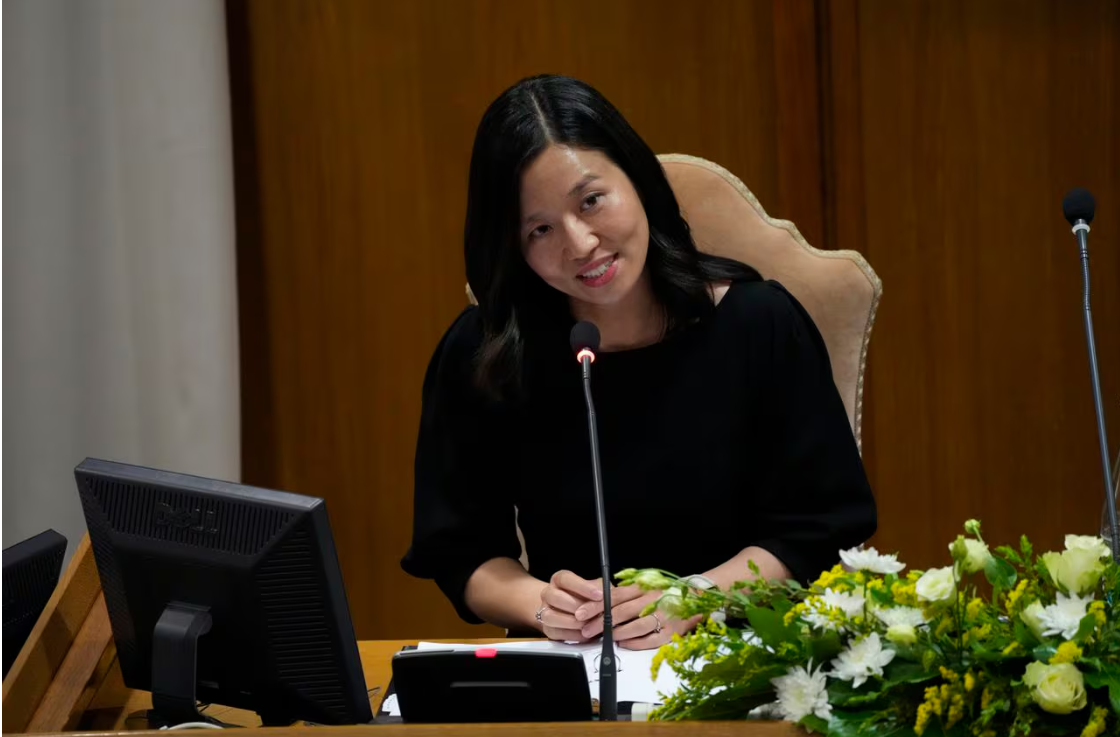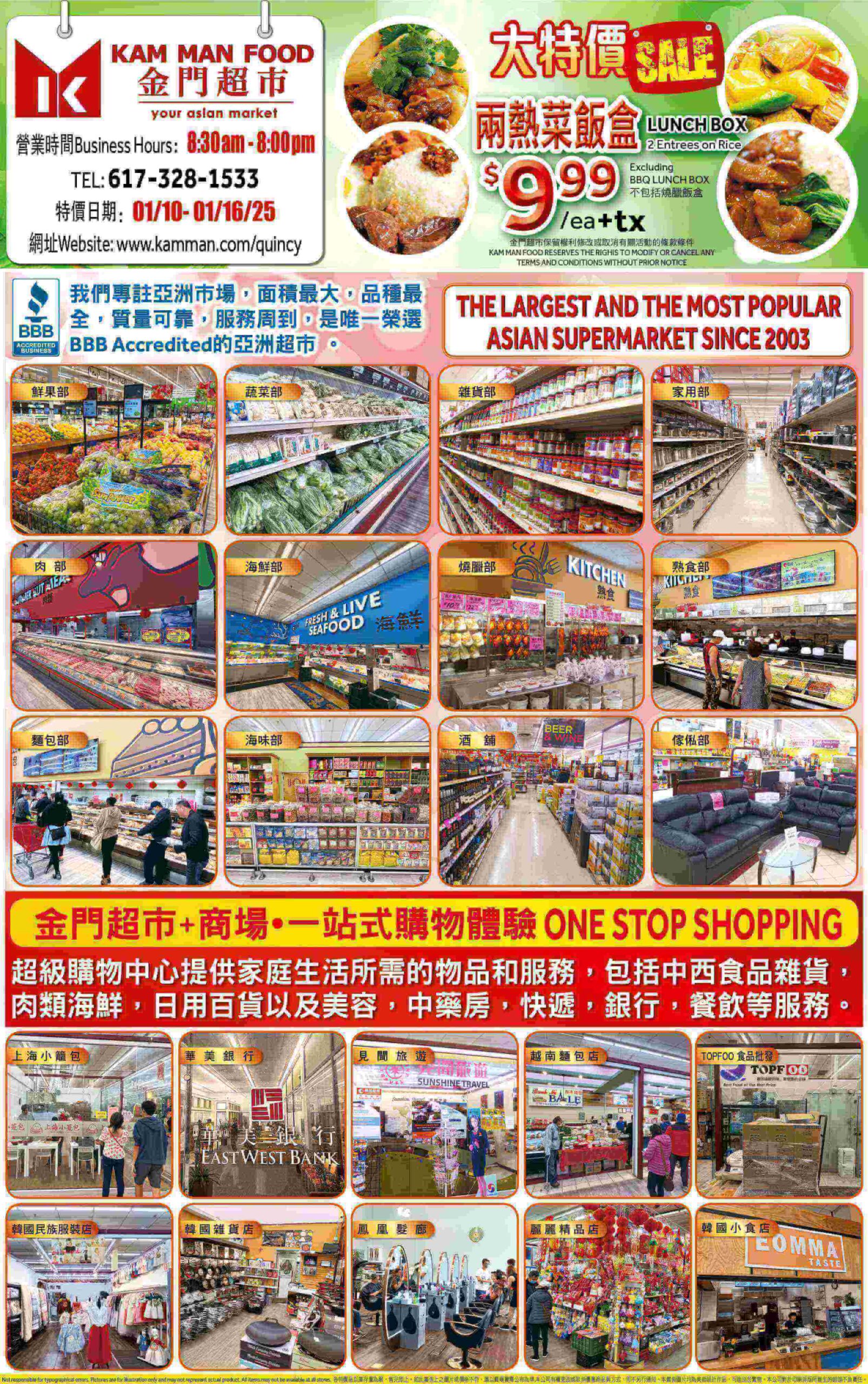波士顿市长吴弭登上梵蒂冈气候会议的国际舞台

【中美创新时报2024 年 5 月 17 日编译讯】(记者温友平编译)波士顿市长吴弭(Michelle Wu)周四(16日)呼吁地方政府应对全球气候危机,并列举了该市所做的一些事例:支持基础设施升级、帮助居民和企业转向可再生能源,以及为年轻人提供这些领域的职业培训。《波士顿环球报》记者萨曼莎·格罗斯(Samantha J. Gross)和尼基·格里斯沃尔德(Niki Griswold)对此作了下述报道。
吴弭在她的第一次国际演讲中有时会提到她的孩子,以强调采取紧急行动的必要性。
她指出,预计波士顿去年冬天的雪量很少,因此她第一次没有给年幼的儿子买新靴子去外面玩。
“我现在谈论的能量是一位不想和孩子们一起度过最后一个雪天的母亲的能量,”她说。 “这是一位母亲的能量,她想让她的孩子们知道,在十二月晴朗的夜晚,查尔斯河冰冻得多么美丽。”
吴弭继续说道:“正是这种个人联系、信念、对未来的信念,以及波士顿为更健康的社区创新公共产品的自豪传统的交汇,塑造了我们应对气候变化的方法。”
吴弭是唯一参加梵蒂冈和罗马教皇科学院主办的为期多天的气候会议的美国市长,她在旋风般的旅行中发表了讲话。到目前为止,它包括一次值得在 TikTok 上观看的公共巴士之旅、与教皇的会面以及与罗马市长的对话,并欣赏论坛的景色。
市长前往意大利参加峰会为期一周,这是她自 2021 年当选以来作为波士顿特使的首次国际访问,此前她的竞选纲领承诺减少该市的碳排放,并使波士顿更具抵御能力 气候变化的影响。
州长莫拉·希利也出席了梵蒂冈气候峰会。
吴弭在演讲中深入探讨了她的政府颁布的一些与气候相关的政策,从将城市资金投资于环保基金,到允许居民选择使用“更清洁、本地采购的电力”为家庭或企业供电的公用事业计划。
吴弭说,波士顿温室气体排放量的 70% 是由建筑物造成的。她强调了一项法令,要求大型建筑随着时间的推移慢慢减少排放,目标是到 2050 年实现净零排放,以及她去年签署的一项行政命令,禁止在新建和翻修的市政建筑中使用化石燃料。
尽管吴弭原本打算在所有新建筑中禁止使用化石燃料,但在得知波士顿不太可能被选为该计划后,该市并未申请州试点计划。相反,该市专注于改变城市规范,以加速全市向净零建筑的过渡。
据波士顿市发言人斯塔西娅·谢普塔(Stacia Sheputa)称,波士顿四分之三的大型建筑预计将有望实现减排条例的 2025 年目标。
吴弭的孩子和她的丈夫康纳·佩瓦斯基(Conor Pewarski)陪同她前往意大利,还有三名工作人员和两名保安人员。
周三,吴弭的工作人员和家人乘坐公共巴士 40 分钟前往罗马,与罗马市长罗伯托·瓜尔蒂里 (Roberto Gualtieri) 会面。
吴弭用她的手机在社交媒体上拍摄了她的“与我通勤”系列的经历,记录了波士顿人的公交车通勤情况。她指出船上有宽敞的轮椅和婴儿车空间,以及供人们携带自行车上车的空间,并经常将镜头转向她的儿子们。
有一次,她在镜头前问她的大儿子布莱斯:“你知道这里的公交车要花多少钱吗?”
他回答说:“孩子们免费!”
到达罗马市政厅或参议员宫所在的坎皮多利奥广场后,佩瓦尔斯基带着孩子们去探索,而吴弭则前往里面参观这座世界上最古老的市政厅建筑。
(这座建筑由米开朗基罗在 16 世纪翻新,装饰着复杂的壁画和巨大的大理石雕塑。吴弭和她的员工开玩笑说,它看起来一点也不像波士顿的野兽派建筑。)
随后,吴弭和瓜尔蒂里讨论了市长们如何在减少排放方面发挥带头作用,并分享了一些想法,例如波士顿的开放街道倡议,旨在在轮流社区的某些周末停止交通,以及罗马在 12 月份延长交通限制,以促进购物区附近的人流。
他们还谈到需要抑制在城市街道上开车的积极性,例如在某些情况下免费提供交通。
瓜尔蒂里说:“我们采取的行动为其他城市确定了可能发生的事情的基调。” 吴弭同意了。
《波士顿环球报》工作人员艾琳·道格拉斯 (Erin Douglas) 对本报告做出了贡献。
题图:波士顿市长吴弭(Michelle Wu)周四(16日)在罗马教皇科学院组织的“从气候危机到气候复原力”峰会上发表讲话。GREGORIO BORGIA/美联社
附原英文报道:
Boston Mayor Michelle Wu takes the international stage at Vatican climate conference
By Samantha J. Gross and Niki Griswold Globe Staff,Updated May 16, 2024
VATICAN CITY — Boston Mayor Michelle Wu called on local governments Thursday to tackle the global climate crisis by touting examples of what her city has done: embracing infrastructure upgrades, helping residents and businesses move to renewable energy, and providing young people with job training in those industries.
Wu, in her first international address, got personal at times, referring to her children to underscore the need for urgent action.
She noted that Boston had been projected to get so little snow this past winter that for the first time, she didn’t buy her young sons new boots to play outside.
“The energy I’m talking about now is the energy of a mother who doesn’t want to have had her last snow day ever with her kids,” she said. “It’s the energy of a mom who wants her kids to know how beautiful the Charles is frozen over on a clear December night.”
Wu continued: “It’s from this intersection of personal connection, faith, faith in our future, and Boston’s proud tradition of innovating public goods for healthier communities — that shapes our approach to tackling climate change.”
Wu, the only American mayor to attend the multi-day climate conference hosted by the Vatican and the Pontifical Academy of Sciences, delivered her remarks during a whirlwind trip. So far, it’s included a TikTok-worthy public bus ride, a meeting with the pope, and a conversation with the mayor of Rome, complete with a view of the Forum.
The mayor’s week-long trip to Italy to participate in the summit is her first international visit as an emissary for Boston since she was elected in 2021, after running on a platform that promised to reduce the city’s carbon emissions and make Boston more resilient against the effects of climate change.
Governor Maura Healey is also attending the Vatican climate summit.
In her speech, Wu delved into some of the climate-related policies her administration has enacted, from investing city money in environmentally friendly funds, to a utility program that allows residents to opt in to powering their homes or businesses with “cleaner, locally sourced electricity.”
Buildings represent 70 percent of greenhouse gas emissions in Boston, Wu said. She emphasized an ordinance that requires large buildings to slowly reduce emissions over time, targeting net-zero by 2050, and an executive order she signed last year banning fossil fuels in new municipal buildings and renovations.
While Wu had intended to ban fossil fuels in all new buildings, the city did not apply to a state pilot program to do so after learning that Boston would be unlikely to be chosen for the program. Instead, the city has focused on changes to city codes to accelerate a transition to net-zero buildings across the city.
Three-quarters of Boston’s large buildings are estimated to be on track to comply with the emissions reduction ordinance’s 2025 goal, according to city spokesperson Stacia Sheputa.
Wu’s children and her husband, Conor Pewarski, are accompanying her in Italy, as are three staff members and a two-person security detail.
On Wednesday, Wu’s staff and familytraveled 40 minutes by public bus for her meeting with Rome Mayor Roberto Gualtieri.
Wu used her phone to film the experience for her “Commute With Me” series on social media, where she documents Bostonians’ bus commutes. She pointed out the wide spaces for wheelchairs and strollers, and the room for people to bring their bikes on board, and frequently turned the camera to her sons.
At one point she asked her older one, Blaise, on camera: “Do you know how much the bus costs here?”
He responded: “Free for kids!”
After arriving at the Piazza del Campidoglio, where Rome’s city hall, or the Palazzo Senatorio, is located, Pewarski took the boys to explore while Wu headed inside for a tour of the building, the oldest town hall in the world.
(The building was renovated by Michelangelo in the 16th century, and is adorned with intricate frescoes and hulking marble sculptures. Wu and her staff joked it looked nothing like Boston’s Brutalist counterpart.)
After, Wu and Gualtieri discussed how mayors can lead the way on reducing emissions, sharing ideas such as Boston’s Open Streets initiative to stop traffic some weekend days in rotating neighborhoods, and Rome’s extended traffic restrictions to facilitate foot traffic near shopping areas during December.
They also spoke about the need to disincentivize driving on city streets, such as by making transit free in some instances.
“The actions we take set the tone for other municipalities as to what is possible,” Gualtieri said. Wu agreed.
Erin Douglas of the Globe staff contributed to this report.

